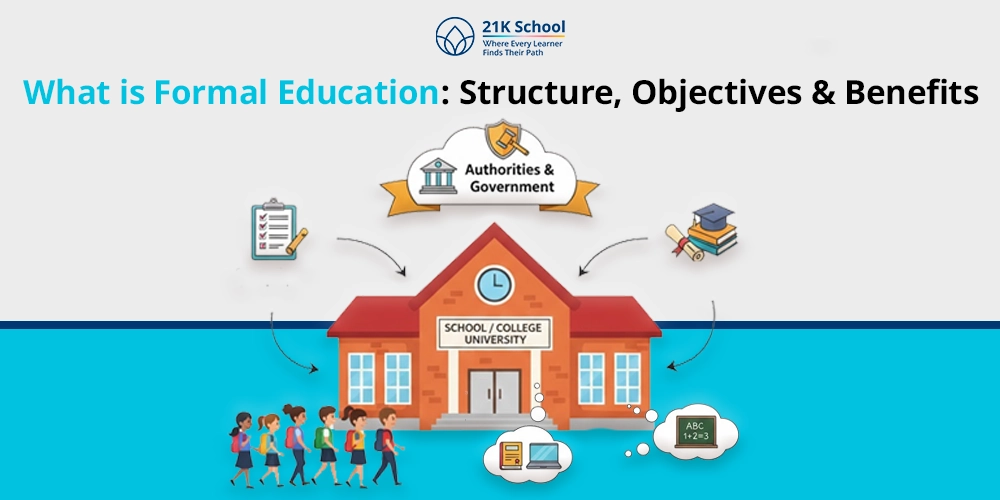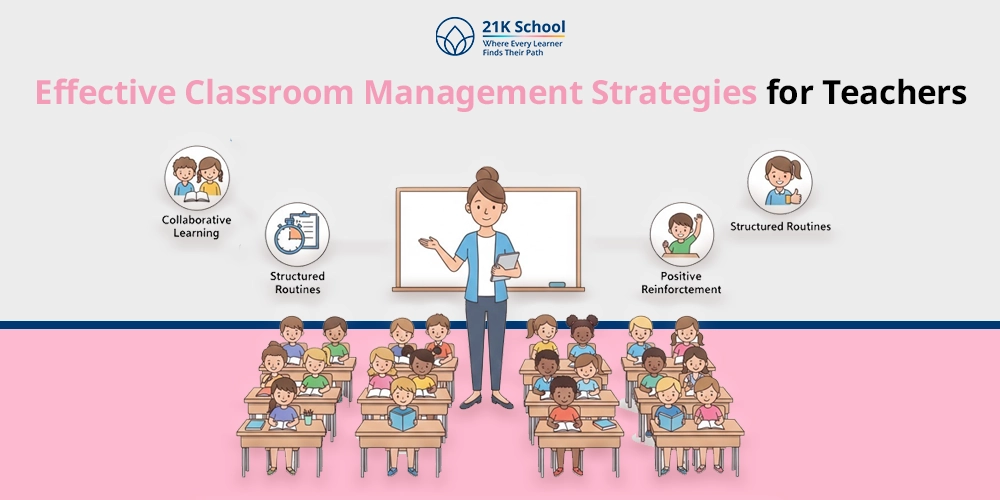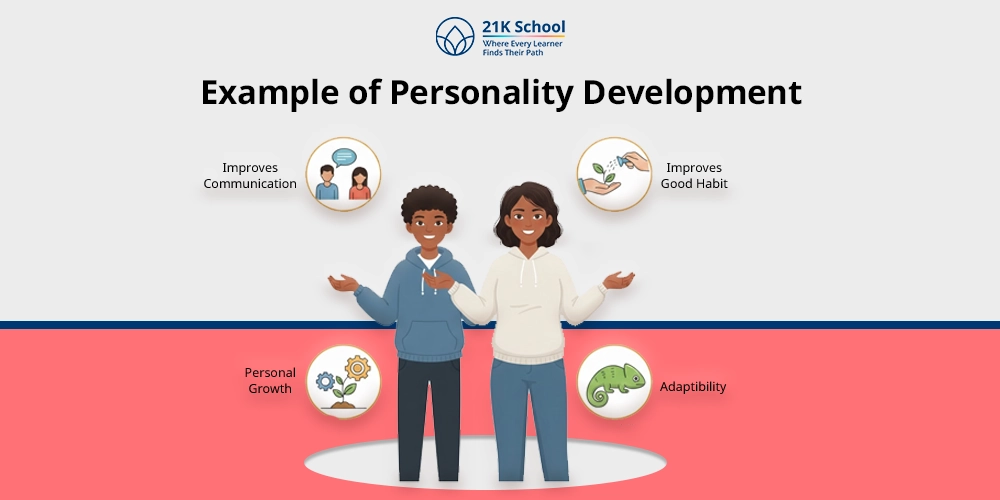
Online learning , generally referred to as e-learning, is more efficient than conventional learning processes and more economical than traditional training materials like printed manuals or in-person seminars.
Companies stand to benefit significantly by reducing these unnecessary expenditures. Employers may convey crucial information using conventional devices like PCs, tablets, and mobile phones.
Information may be provided in small portions via online learning courses.
They deploy media tools, including video games, simulations, and films, that enable students to access information whenever they need it and study at their pace.
With these tools, training may take place anytime and anywhere; all students need is internet access.
Online education is better then classroom as online education has proven to be more beneficial.
Table of Contents
What Accounts for the Success of Online Education?

E-learning is effective for various reasons, but what matters most is the outcomes it produces. E-learning techniques replace conventional learning procedures in the following ways:
1. Reduced Printing Expenses

Learning materials are maintained online in a single readily available download, allowing quick updates to reflect changes.
2. Productivity was Increased by Doing Away with the Classroom

Students can implement new ideas during their regular workday rather than wasting time and money by keeping teachers and students in the classroom for days or weeks.
After all, using unique abilities and information is the main objective here.
3. Faster Learning Times Since Retention is Higher

According to several academic studies, online learning raises retention rates by double digits.
This implies that employees will spend more time applying training materials in their professional jobs and less time learning and reviewing them.
Read on to know about the future trends in online education by checking here.
The Cost of a Regular College
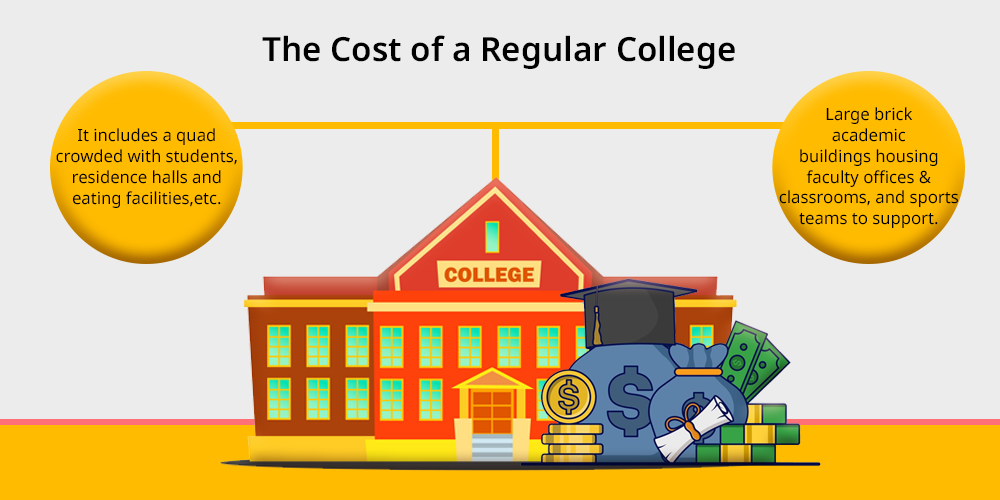
For various reasons, traditional colleges are often more expensive than low-cost online education. A specific type of experience is associated with traditional schools.
Also Read, How can expensive education change into affordable online education
This includes a quad crowded with students, residence halls and eating facilities, large brick academic buildings housing faculty offices & classrooms, and sports teams to support.
Although many of these facilities are valued by students and frequently improve the overall college experience, they are not free.
That does not mean that traditional schooling is equally expensive. Campus-based education encompasses various possibilities, including community colleges, public universities, and private low-cost schools, all of which have a wide range of tuition costs.
This on-the-ground college experience is what traditional college students, generally between 18 to 22, have in mind and will enormously benefit from it.
The processes and support put up in these situations to aid and guide these younger students through their time at an institution are typically what they need to succeed, and they do so as a consequence.
It is important for students to find out if this kind of school appeals to them because they might be able to find a regular school that meets their needs.
Price of Online Education
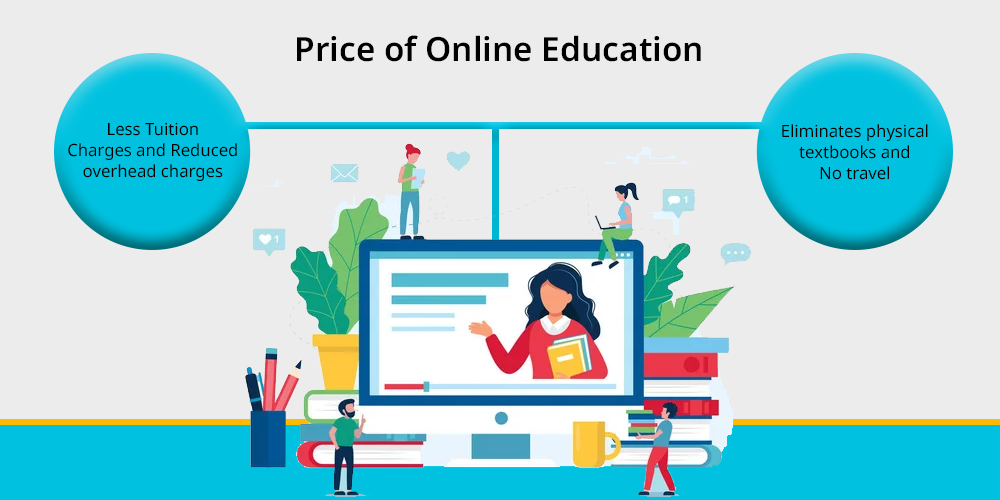
Online learning provides a more cost-effective solution since you may receive a top-notch education for a lot less due to the lowered running expenses of these courses. The price of course materials and transportation is frequently removed from online courses, and cheaper tuition is.
- Less Tuition Charges: Tuition charges are limited due to reduced educational expenses.
- Reduced overhead charges: No infrastructure, libraries, or learning material costs
- Eliminates physical textbooks: Use of digital resources and online learning resources, reducing the costs of learning materials.
- No travel: No on-campus living charges and need to commute daily.
The estimated cost analysis of online education is still a sizable commitment; it’s crucial to remember that.
Many assume that students prefer online learning as it is affordable when they begin their research for a degree programme. Therefore, they are sometimes shocked to hear that tuition is rather pricey.
You may need to depend on government aid (particularly student loans) and other measures to help pay for an online degree, even if you do your research and enrol in a high-quality, affordable online university.
It’s also crucial to understand that, unlike traditional, campus-based colleges, most online courses do not give the same institutional support.
Also Read, 10 reasons why online education is here to stay
Benefits of Online Education

People who are unlikely to be capable of enrolling at a traditional brick-and-mortar institution due to several issues seek online education.
1. Flexibility

Due to the absence of a predetermined schedule, students are free to balance their careers and studies. In a regular classroom, discussion hours are specified, and students cannot modify them, requiring them to schedule their calendars around these times.
Most individuals who take online education generally have other commitments and prefer this learning style as it permits them discretion over how they’ll spend their time on various assignments.
2. Lower Costs

For numerous reasons, digital learning may be cheaper. For instance, there is no payment for travelling.
The online learners are unaffected by different mobility-related charges, including petrol, parking, automotive maintenance, and expenditures connected with utilising public transportation.
3. Potential Networking Contacts

Online learning enables students to connect with peers from different nations or continents. This typically offers new options for working together on a business with other people.
In addition, exposure to different cultures helps youngsters become aware of the culture and adapt to it.
4. Expertise is Accessible

Students who attend college online may obtain specific graduation courses that local or easily accessible educational institutions don’t provide.
Online education makes it feasible for more people to receive information that’s not readily available in certain places of the globe.
Cost Analysis of Online Education vs Traditional Education
Online education generally incurs lower costs, such as no need for physical facilities and commuting expenses, and other related costs, due to which it becomes popular among students.
In contrast, offline education often involves higher tuition, boarding, and travel costs, making it a more expensive option for many students. However, the cost analysis of both online and offline education varies and depends from person to person.
Below you can check the detailed cost analysis of online and offline education
| Aspects | Online Education | Regular Education |
| Tuition Fees | Tuition fees for online education are low as compared to offline education. | Tuition fees for regular education are expensive, especially in private institutes |
| Travel Cost | In online education, there is no travel cost, as a student can continue there classes from the comfort of their home. | In offline education, students have to travel from one place to another; this costs a lot. |
| Accommodation Cost | In online education, there is no need for accommodation, as a student can complete their classes from there own home. | Students who are from out town have to stay in rental rooms or hostels, which causes them to pay extra money. |
| Hidden Fees | In online education, there are no hidden charges; a candidate only needs to pay tuition fees. | Regular classes always charge extra money in terms of activity fees, student development fees, etc. |
| Material Fees | In online education, students don’t have to buy any books or notebooks as they get e-books for their study, and hence it saves their money. | In offline education, students have to buy books, notebooks, study materials, and so on. This cost them a lot in a year. |
Comparison Between Cost of Online Classes and Regular Classes
Online learning is considered the best in terms of cost efficiency. An invitation to unmatched flexibility is extended by online education. Students can customize their learning plans which is helpful for people juggling work or family obligations.
This flexibility fosters an atmosphere that supports personalized learning opportunities. Traditional education helps students and teachers develop a real in-person relationship.
Meeting people face-to-face improves the educational process by offering opportunities for immediate clarification and mentoring.
The cost of online classes and regular classes will vary depending on various factors, below you can check the fee comparison of regular classes and online classes of 21K school.
| Age Group | Traditional Education Overall Cost | 21K Online School Overall Cost |
| Up to 3 years | 5,50,000 | 2,70,000 |
| 3 to 5 years | 6,00,000 to 10,00,000 | 3,00,000 to 6,00,000 |
| 6 to 8 years | 9,00,000 to 12,00,000 | 6,00,000 to 8,00,000 |
| 9 to 13 years | 12,00,000 to 18,00,000 | 8,00,000 to 10,00,000 |
| 14 to 18 years | 18,00,000 to 25,00,000 | 10,00,000 to 15,00,000 |
Conclusion
Students can contact the financial aid departments of the schools they are contemplating to learn more about standard help packages, their eligibility for federal aid, and tuition charges.
They should also compare the overall amount they would have to pay each semester. The entire cost of attendance at the institutions they are considering should also be extensively investigated.
It’s vital to determine whether students will be subject to extra, undisclosed costs for technology, online libraries, materials, student activity fees or access to remote learning programmes (for on-campus studies) (for on-campus programs).
These aspects must be considered when calculating how much your education will cost, which may add up swiftly. Stay tuned to 21K School for more information.

